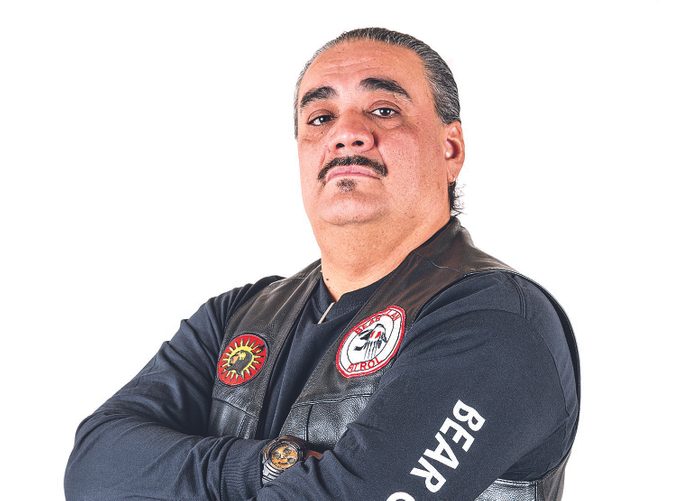Great Canadians: Bear Clan Patrol
The safety group Bear Clan Patrol offers a sense of security to Winnipeg’s North End.

As the grey October light fades away, two dozen people mill about in a courtyard in Winnipeg’s North End. They clutch Styrofoam cups of coffee and carry backpacks filled with supplies: first-aid kits, for instance, or fruit and extra mittens. (Here are six inspired ways to put Styrofoam to good use around the house.)
At the head: broad-shouldered 48-year-old James Favel, who divides those assembled into women-led crews of five. “Pitter patter, let’s get at ‘er,” he then commands, and the groups fan out. Their two-way radios crackle to life, and the beams of their flashlights bob along the pavement.
This is how most nights begin for Bear Clan Patrol Inc. Five times a week, its volunteers hit the streets, their yellow vests a new fixture in this corner of town, which has long wrestled with some of the highest crime and poverty rates in the city. Their nightly mission is open-minded, an ad hoc mixture of social outreach and anti-violence intervention.
A year and a half ago, Winnipeg was still reeling from the August 2014 murder of Tina Fontaine, a 15-year-old Anishinabe girl. Favel, who chairs a North End residents’ association, was eager to set up something to help protect women in the area.
In this, he was inspired by the work of a local young organizer named Michael Champagne, who spearheads a series of weekly community meetings designed to push back at violence. “He showed me that it can be done,” says Favel.
On one Thursday in the fall of 2016, Bear Clan members were first on the scene to assist a man who had lost two of his fingers in a machete attack. The next evening, the patrol defused a street fight and raced to help a young mother after an estranged ex-partner forced his way inside her apartment.
It was an unusually hectic couple of nights. Even before the Friday shift began, one member spotted two used needles on the ground. Sometimes they find baggies of meth. But often the patrol is uneventful – the crew greets everyone they pass and pause to chat or hand out snacks.
The original incarnation of Bear Clan, co-founded by the late indigenous advocate Larry Morrissette, patrolled the neighbourhood in the 1990s but eventually fizzled out. The initiative was officially revived in 2015, with Morrissette’s blessing.
Under Favel’s leadership, Bear Clan 2.0 has built working relationships with the Winnipeg Police Service. It has also sparked a spinoff, Mama Bear Clan, in the adjacent neighbourhood of North Point Douglas. There are plans to add a youth patrol.
The demands of organizing have become so great that Favel has left both his job as a trucker and a part-time gig at a North End halfway house. To make ends meet, he has cobbled together community grants while he searches for stable funding. He doesn’t mind, though. “I was never fulfilled by trucking like I am with this work,” he says. “Seeing the community come together and seeing the smiles on people’s faces when you give something to eat, well, not to be corny, but it feels good.”
Through Bear Clan, Winnipeg is united. Volunteers who show up to patrol come from varying backgrounds. They include grandmothers, army veterans, doctors, ex-bikers who have served prison time and residents of the city’s wealthier suburbs. Others have no permanent home. Twenty-year-old Meagan Owen had spent much of 2015 struggling with poverty and addiction when patrolling Bear Clan members offered to help her secure housing and employment. At first, she resisted. “I was kind of apprehensive,” she says, “but all the people I’ve talked to went through it – the addictions and the struggles.”
Now Owen is reaching out to others by regularly joining the patrol. In early November, she was preparing to enter an addiction treatment program and hoped to secure work as a chef. “I’m feeling like I accomplished something,” she says. “it’s productive.”



